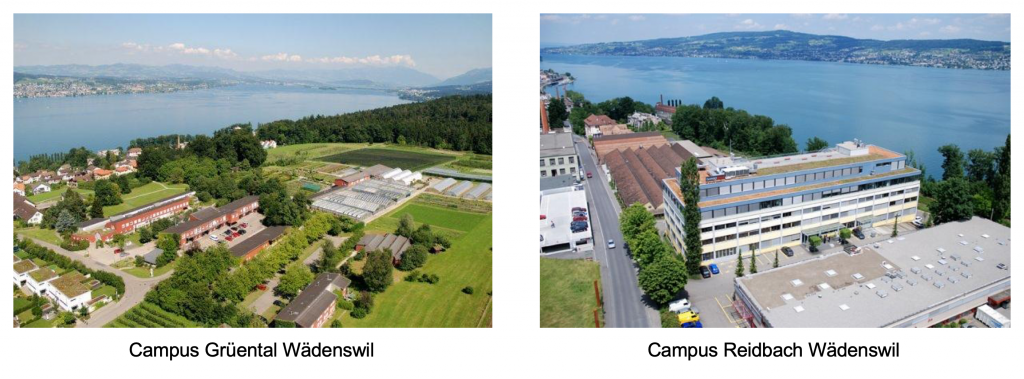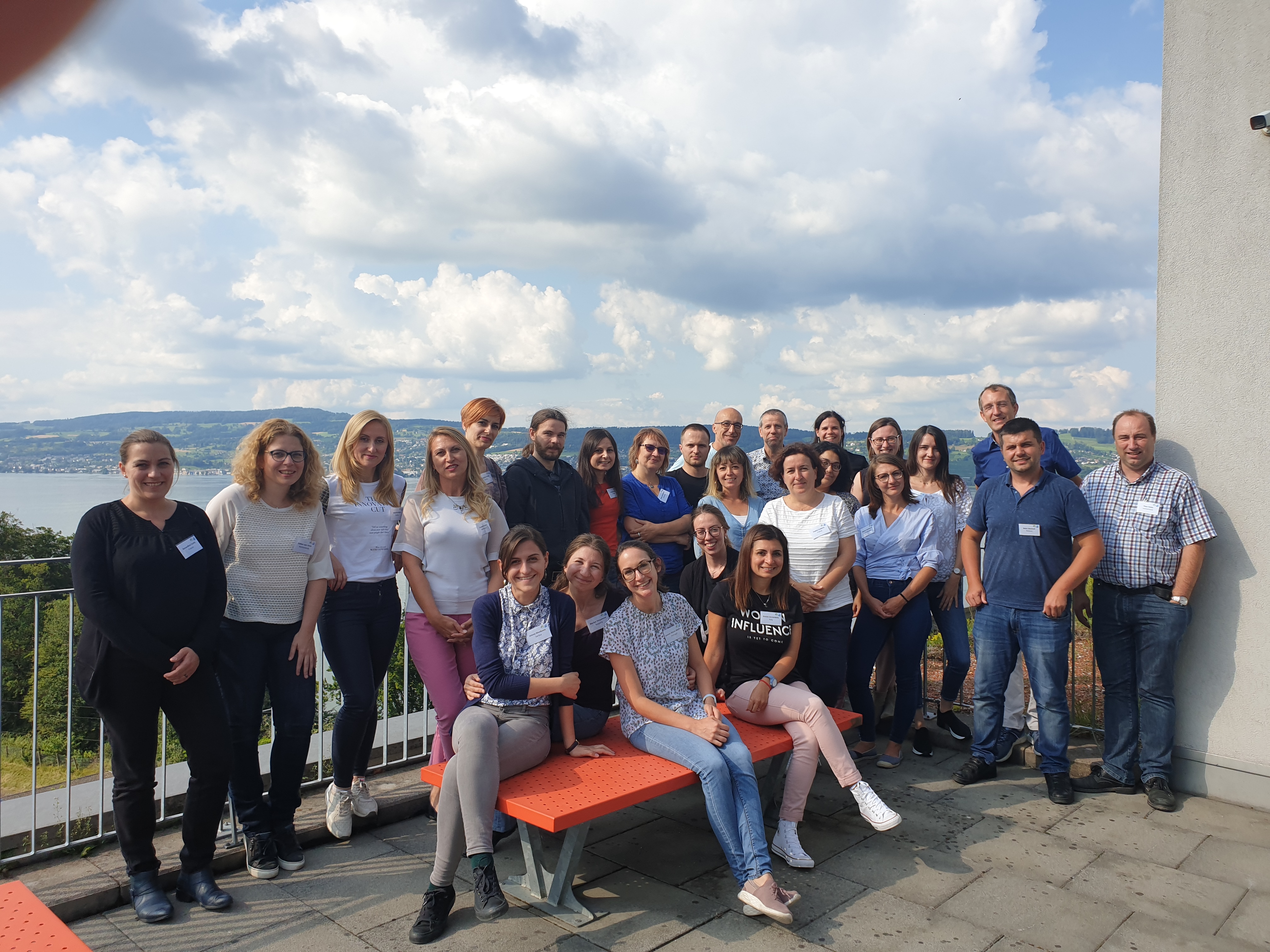Training School 2019 (Wädenswil)
Training School on “Molecular typing of Xanthomonadaceae – from epidemiological surveillance to outbreak investigation”
The 2nd Training School of the EuroXanth COST Action on “Molecular typing of Xanthomonadaceae – from epidemiological surveillance to outbreak investigation” took place in Wädenswil, Switzerland, from July 15 to 19, 2019.
This Training School addressed tools and technologies used for molecular typing of bacteria of the Xanthomonadaceae family at different taxonomic levels with a strong focus on DNA-based approaches to study genetic diversity and population structure, from the genus to the strain level. The Training School introduced databases and software tools to analyse data from 16S rRNA gene, MALDI-TOF MS, genome-wide ANI/SNP, MLST/MLSA, VNTR/MLVA, and CRISPR analyses. The Training School explained concepts and methods and gave ample room for hands-on tutorials on different datasets, accompanied by a few seminars and demonstrations.
Molecular typing has been shown powerful to investigate outbreaks and for epidemiological surveillance. Different spatio-temporal scales can be investigated to decipher the bacterial evolution from micro- to macro-evolution. Epidemiological typing approaches should retain an appropriate level of genomic resolution to address these different questions. The different molecular markers that will be presented may be used in typing systems for different purposes from discriminating epidemiologically related strains to long-term surveillance of strains.
At a glance:
- Date: July 15-19, 2019.
- Venue: Zürich University of Applied Sciences (ZHAW), School of Life Sciences and Facility Management, Campus Reidbach, Einsiedlerstrasse 31, 8820 Wädenswil, Switzerland.
- Organisers: Dr. Joël Pothier & Mrs. Nay Dia, Zürich University of Applied Sciences, Wädenswil, Switzerland.
- Contact details: Joel.Pothier@zhaw.ch
- Trainees: Max. 20 persons.
- Targeted trainee audience: from beginners to occasional users; academic or commercial.
- Trainee grant: The financial support from COST CA16107 is a fixed contribution of up to 1000 € for max. 18 persons to cover accommodation costs and travel expenses. Trainees grants do not necessarily cover all expenses related to attending the training school.
- Other participants: Trainees not paid by COST CA16107 are welcome to participate; the fee for participation constitutes 500 €.
- Application procedure: Submission through email (Joel.Pothier@zhaw.ch, with Ralf.Koebnik@ird.fr in CC) of the following documents: i) intent of interest (including bioinformatics software skills and level), ii) recommendation letter, and iii) short curriculum vitae.
- Requirement: The trainees will require to bring along a laptop (with sufficient admin rights allowing to install applications).
-
Deadline for application: March 31, 2019.
- Announcement of eligible trainees: April 30, 2019.
Trainers:
Dr. Sophie Cesbron / INRA, IRHS (Institut de Recherche en Horticulture et Semences), 42 rue Georges Morel, 49071 Beaucouzé – France.
Dr. Joana Cardoso Costa / Universidade de Coimbra, Departamento de Ciências da Vida da Faculdade de Ciências e Tecnologia, Calçada Martim de Freitas, 3000-456 Coimbra – Portugal
Dr. Christian Vernière / CIRAD, UMR BGPI (Biologie et Génétique des Interactions Plante-Parasite), TA A-54/K, Campus International de Baillarguet, 34398 Montpellier – France.
Dr. Ralf Koebnik / IRD, UMR IPME (Interactions Plantes-Microorganismes-Environnement), 911 avenue Agropolis, 34394 Montpellier – France.
Mrs. Nay Dia / Dr. Joël Pothier / EGSB team members / Zürich University of Applied Sciences, School of Life Sciences and Facility Management, Einsiedlerstrasse 31, 8820 Wädenswil – Switzerland.
Venue:
Zürich University of Applied Sciences (ZHAW)
School of Life Sciences and Facility Management
Institute of Natural Resource Sciences
Campus Grüental
Grüentalstrasse 14
8820 Wädenswil – Switzerland
About the Zürich University of Applied Sciences:
The ZHAW is one of the leading universities of applied sciences in Switzerland. Teaching, research, continuing education, consulting and other services are both scientifically based and practice-oriented. ZHAW graduates are able to apply their knowledge responsibly in demanding professional fields. In its work in research & development, the ZHAW concentrates on important societal challenges, with a particular focus on energy and societal integration. With locations in Winterthur, Zürich and Wädenswil, the ZHAW is firmly integrated in the local region whilst also cooperating with international partners. There are eight Schools in the University: Applied Linguistics, Applied Psychology, Architecture, Design and Civil Engineering, Engineering, Health Professions, Life Sciences and Facility Management, Management and Law, and Social Work.
The School of Life Sciences and Facility Management in Wädenswil offers degree programs, continuing education, research and services in the fields of biotechnology, chemistry, food technology, natural resource sciences, as well as facility management.
The School – a centre of excellence for Life Sciences and Facility Management – is located in an attractive setting in Wädenswil, on the shores of the Lake of Zürich, with a second site in the Technopark in Zürich.

About Wädenswil:
Wädenswil is an attractive small city with around 20’000 inhabitants and with a high quality of life. It lies in a privileged location on the Lake Zürich with idyllic landscapes and the romantic peninsula of Au. It is also very close to recreational areas of the Alp mountains.
The fastest train takes 17 mins to reach Zürich’s main station. Express trains going to Basel and Chur stop at the station. Wädenswil is also perfectly connected by car with the expressway A3 (Zürich – Chur).
Accomodation:
The Zürich University of Applied Sciences does not have accommodations. Trainees are thus requested to perform the booking of their accommodation. Trainees are strongly recommended to try booking at the youth hostel in Richterswil (Jugendherberge SJH Horn). Keep in mind that public transportation can also be quite expensive (more info here).
Miscellaneous:
- Airport: Around 60 airlines connect Zürich to almost anywhere in the world. Thanks to his excellent public transport links considered to be one of the best connected locations in Switzerland (around 350 rail connections and over 700 bus and 400 tram departures a day), Zürich Airport can be reached quickly and easily from everywhere in Switzerland. Arriving passengers must purchase tickets from the SBB travel center counters (06:15 a.m. to 10:30 p.m.) or automats, for example at the Check-in 3 area (no ticket sold on the train!). A ticket to reach Wädenswil (2 hours validity) costs 13.00 CHF. More info on public transports here.
- Citizens from Western European countries need a valid identity card or a passport that did not expire more than five years ago. Nationals of other countries need a valid passport; a visa is generally not required. Check entry requirements if necessary.
- Swiss German is one of the official languages spoken together with French, Italian and Romansch. English can generally be spoken.
- Population: 8.42 million (2017); Capital: Bern; Administrative subdivisions: 26 cantons.
- The currency is the Swiss Franc (CHF, sFr, Fr)
- The voltage is 230; wall outlets are unique to Switzerland and there is a limited compatibility with other continental European plugs. Check if you need an electric adapter.
- Telephone code: (+41)
As the second EuroXanth event bringing together Trainers and Trainees of European institutions working on Xanthomonas and Xylella, this event was a great success of this COST Action. The success is not only due to the high-quality presentations, demonstrations and exercises, but it is also linked to the lively exchange among all participants in a very friendly and open-minded atmosphere. There was ample of time for discussions, which were not restricted to the focus of the Training School and which will certainly help all of the participants in their future career.

The EuroXanth COST Action would like to thank all the organisers, trainers and trainees for their commitment to this event.
